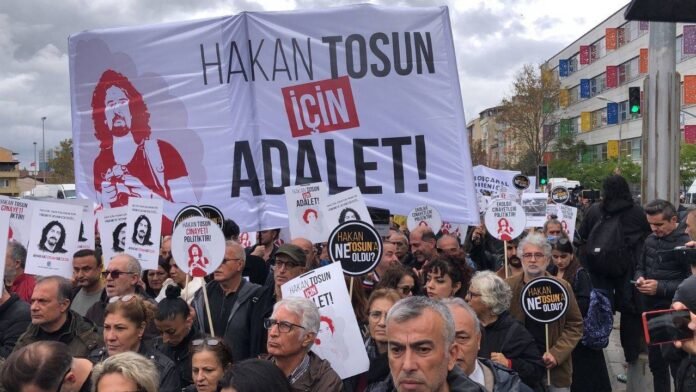Hundreds gathered in İstanbul on Thursday to bid farewell to journalist and environmental filmmaker Hakan Tosun, who died on Monday after a brutal street attack that colleagues believe was a targeted assault over his reporting, calling for justice for his killing, Turkish Minute reported.
Tosun, 50, was found unconscious on October 10 in Esenyurt, a working-class district on İstanbul’s western outskirts, and died three days later in a hospital. Two suspects have been detained, while lawyers say one more person remains at large. His family said they were not informed of his condition for nearly 27 hours and that his identity was initially unregistered at the hospital.
Press freedom groups and environmental organizations across Turkey have demanded a full investigation, saying the attack reflects a climate of impunity surrounding violence against journalists. Opposition lawmakers have also moved to press for answers in parliament.
Zeynel Emre, a lawmaker from the main opposition Republican People’s Party (CHP), submitted a formal parliamentary inquiry to the interior ministry, asking whether Tosun’s environmental reporting played a role in the attack and demanding clarification on a series of procedural failures. His questions include why emergency services took so long to notify the family, whether key surveillance footage was seized by suspects’ relatives and why Tosun was kept for hours in an emergency ward before being moved to intensive care.
A farewell under heavy police presence
Hundreds of mourners gathered outside the Nurtepe Metro Station and marched to the nearby Nurtepe Cemevi, an Alevi house of worship that frequently hosts secular and activist funerals. Police in riot gear surrounded the procession, which moved through narrow residential streets chanting “Justice for Hakan, justice for nature.”
Participants carried banners reading “What happened to Hakan Tosun,” “Journalist killings are political” and “Justice for Hakan.” Among those present were the mothers and relatives of victims of state violence, opposition politicians and journalists unions.
Those attending included Gülsüm Elvan, whose teenage son Berkin Elvan was killed by a police tear-gas canister during the 2013 Gezi Park protests; Erkan Baş, leader of the leftist Workers’ Party of Turkey (TİP); İbrahim Akın and Ali Kenanoğlu of the pro-Kurdish Peoples’ Equality and Democracy Party (DEM Party); Orhan Sarıbal of the CHP; Seyit Aslan, head of the Labor Party (EMEP); and Alper Taş, a senior figure in the Left Party (SOL).
Colleagues and family demand justice
At the ceremony Tosun’s attorney, Onur Cingil, said the case advanced only after public pressure forced the authorities to act. “If people hadn’t asked ‘Where is Hakan Tosun?’ this file would have been buried,” he said, accusing police of mishandling early evidence collection. “There seems to be an organized network more efficient than law enforcement itself,” he added.
Tosun’s sister, Öznur Tosun, described him as a man who “mourned even a fallen tree,” promising to continue his environmental campaign. Friends and fellow activists said he was known for his gentle manner and for documenting deforestation, mining and water-pollution projects across Turkey.
Prominent figures drew parallels between Tosun’s death and earlier cases of violence against dissidents. Meryem Göktepe, sister of journalist Metin Göktepe, who was beaten to death by police in 1996, said Tosun “was killed for seeking the truth.” Erkan Baş called him one of Turkey’s “invisible heroes,” adding that his killing “has become a rallying cry for justice.”
Questions over hospital negligence
The case has also raised concerns about possible medical negligence. Columnist Çiğdem Toker of the T24 news website wrote that Tosun was left for hours in the emergency unit of Başakşehir Çam and Sakura City Hospital — a large public-private partnership hospital operated by a Turkish-Japanese consortium — before being transferred to intensive care. Toker questioned whether he might have survived had he been admitted earlier and urged an administrative inquiry into the hospital’s handling of the case.
Toker’s column echoed growing public frustration over Turkey’s public health system, which critics say has become opaque and profit-driven under the ruling Justice and Development Party (AKP). “If Tosun had been taken to intensive care immediately, we might be discussing his recovery, not his funeral,” she wrote.
Tosun began his career in radio in the 1990s and later produced documentaries on environmental and labor issues, including protests against mining operations in western Turkey and resistance to dam construction in the Black Sea region. He was widely respected among grassroots ecological groups and often worked independently, documenting environmental degradation and urban gentrification.
Earlier this week, Reporters Without Borders (RSF) urged Turkish authorities to investigate the motive for the attack and ensure accountability. Turkey ranks 159th out of 180 countries in RSF’s 2025 World Press Freedom Index, reflecting years of media repression and recurring violence against journalists.
Following the funeral, mourners carried Tosun’s coffin to Yeni Ayazağa Cemetery in northern İstanbul, chanting “Hakan Tosun is immortal.”















